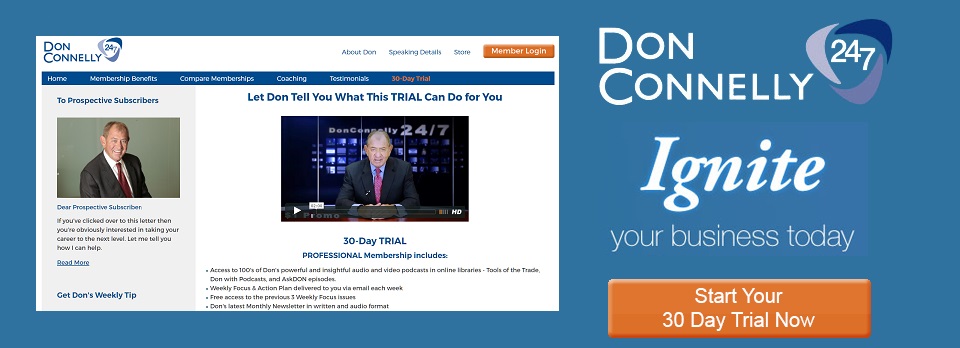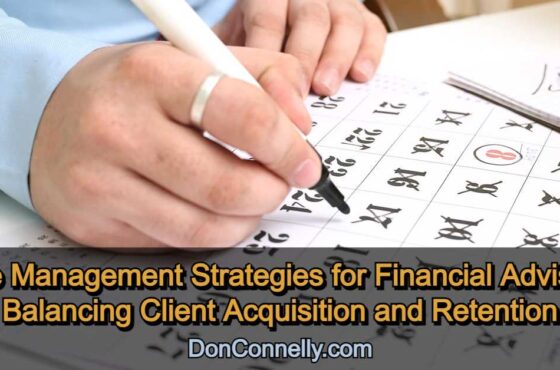12 Questions Great Financial Advisors Ask
 Being a professional Financial Advisor is quite challenging as there are plenty of financial professionals trying to sell nearly the same inventory. So the question really is: what would set you apart from your competition? What would make you a Great Financial Advisor?
Being a professional Financial Advisor is quite challenging as there are plenty of financial professionals trying to sell nearly the same inventory. So the question really is: what would set you apart from your competition? What would make you a Great Financial Advisor?
► Check out Don Connelly’s CD, Distinctly Different: You Gotta Stand Out
I believe one thing great Financial Advisors are known for is finding a well-rounded financial solution for each client. But formulating a comprehensive wealth-building and financial management plan not only demands maturity in decisions, long-term vision, planning, motivation and leadership skills; it also requires encouraging a client to talk and reveal the entire picture to help you get an in-depth understanding of their financial and personal aspirations and concerns.
Therefore, asking the right questions to initiate the right dialogue is imperative. In today’s post, I’ll share with you 12 questions that can spark a good conversation between you and your prospective client.
Some of these questions I’ve heard from Don Connelly, others I’ve found on blogs like Money Zen and Today.com, but all of them can help you build trust and minimize chances of distortions, misinterpretations, or incorrect assumptions:
1. What prompted you to choose me?
Start off on a modest note by asking why they hired you or are considering hiring you. Knowing how they made their choice will give you an insight into what they expect from you; thus helping you build a strong client relationship from the start.
2. What are your major health concerns?
Old age can be expensive, particularly if your client has major health issues. This question would bring to light potential health issues, long term care policies, life insurance, Medicare, etc. which in turn would help you suggest a suitable solution/product as part of your overall financial plan.
3. What are you saving for?
Try and figure out your clients’ motive behind visiting a Financial Advisor. Try and assess what they are saving for. Is it for a home, children’s higher education fees, retirement planning, or a new business venture? Suggesting a financial plan becomes easier when the goal is clearly defined.
4. What is your current household income?
Once the client shows their trust in you, it becomes easy for them to share the financial status, income, investments and expenses with you. Ask them about their household income and monthly expenses and if they expect it to change in the near future. Having a clear idea about the income stream and investment strategy will help you manage their finances in the best possible way.
5. Do you adhere to a strict household budget?
Ask your clients about their daily expenditures and whether they have an organized household budget. To help your clients achieve their financial goals you need a proper understanding of their spending habits. This will let you formulate a plan that is in tune with their budgetary constraints as well as advises them on optimizing their budget appropriately.
6. What are the top 3 reasons that would force you to leave?
This is definitely an eye-opening question that would tell you your clients’ expectations and the boundaries you should stick to. When answering this question, your client will reveal important information like if they have fired an Advisor before and why. Do your best to meet their expectations as satisfied clients are what great Financial Advisors are all about!
7. How often would you like me to interact with you and what is your preferred mode of communication?
To make your mark in the crowd, ask your clients their preferred mode of communication and follow suit. Following the communication schedule your client wants is an easier way to get them involved in the whole process as well as allow you to spot opportunities where you can demonstrate you care more than clients expect you to.
8. Do you have any questions or concerns regarding the suggested financial plan?
Most often Advisors use planning tools and software, where client risk tolerance is taken into account, to create and follow the investment plan. However, in case they feel the recommendations made by you are too conservative or too aggressive, ask clients if they are happy with the suggested plan; be prepared to make the necessary changes.
9. What do you expect of your Advisor?
Another great question to ask prospects and clients has to do with what they expect of their Financial Advisor. Is it just the fulfillment of their goals, or do they look for other things like – honesty, care, leadership, effective communication, etc? This will not only portray you as an Advisor who genuinely wants to establish a long term association, but also helps you plan the next steps to better manage the relationship.
10. Are you a disciplined investor?
Success in investing not only depends on how suitable the financial plan is, but also on whether the client is a disciplined investor. That is someone who:
- Remembers to fund a plan at the right time;
- Understands the time horizon, investment choices, the risks associated;
- Consistently stays focused on the long term plan.
Knowing your client’s commitment to the investment plan will help you determine how and what you can do to help them stay on track once the plan has been implemented .
11. Do you know how to reach me if needed?
Clients have queries. Make sure they know how to contact you to receive the information they are looking for. Make it super easy for them to get in touch with you when needed.
12. Do you know what a succession plan is?
Clients are often concerned about knowing where to go and whom to approach in case of an unforeseen eventuality with their Financial Advisor. Sparking a discussion around your own “succession plan” will put them at ease. You will not only come across as a long-term planner for your own business, but also as an Advisor who is truly concerned about the client’s hard earned money even in your absence.




